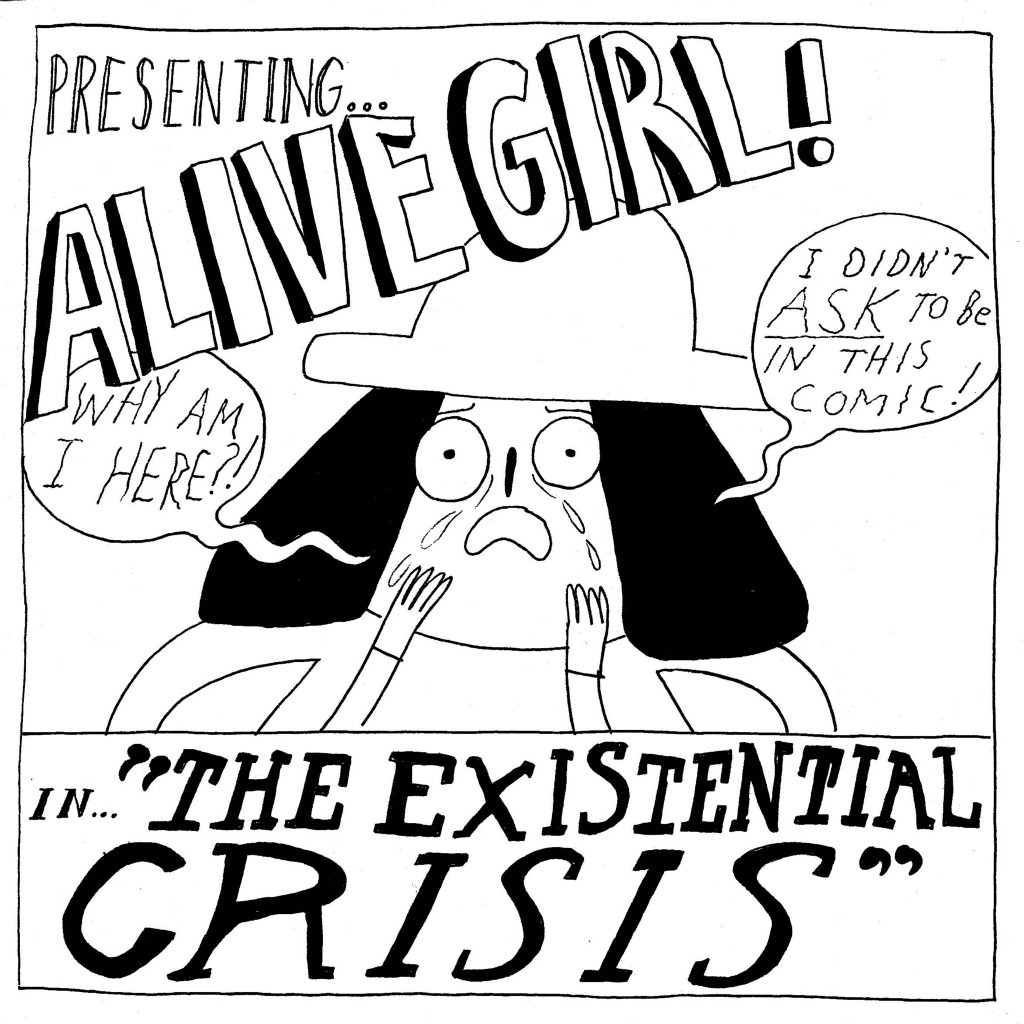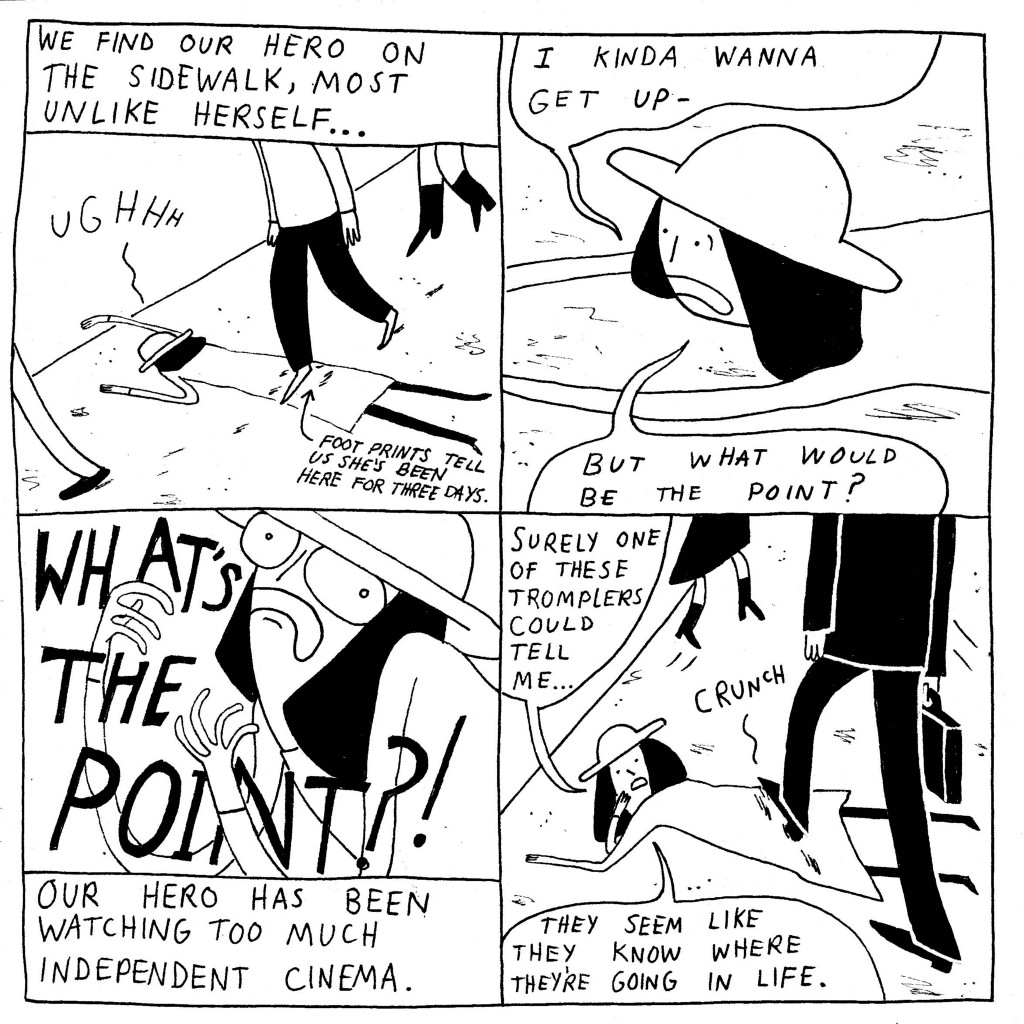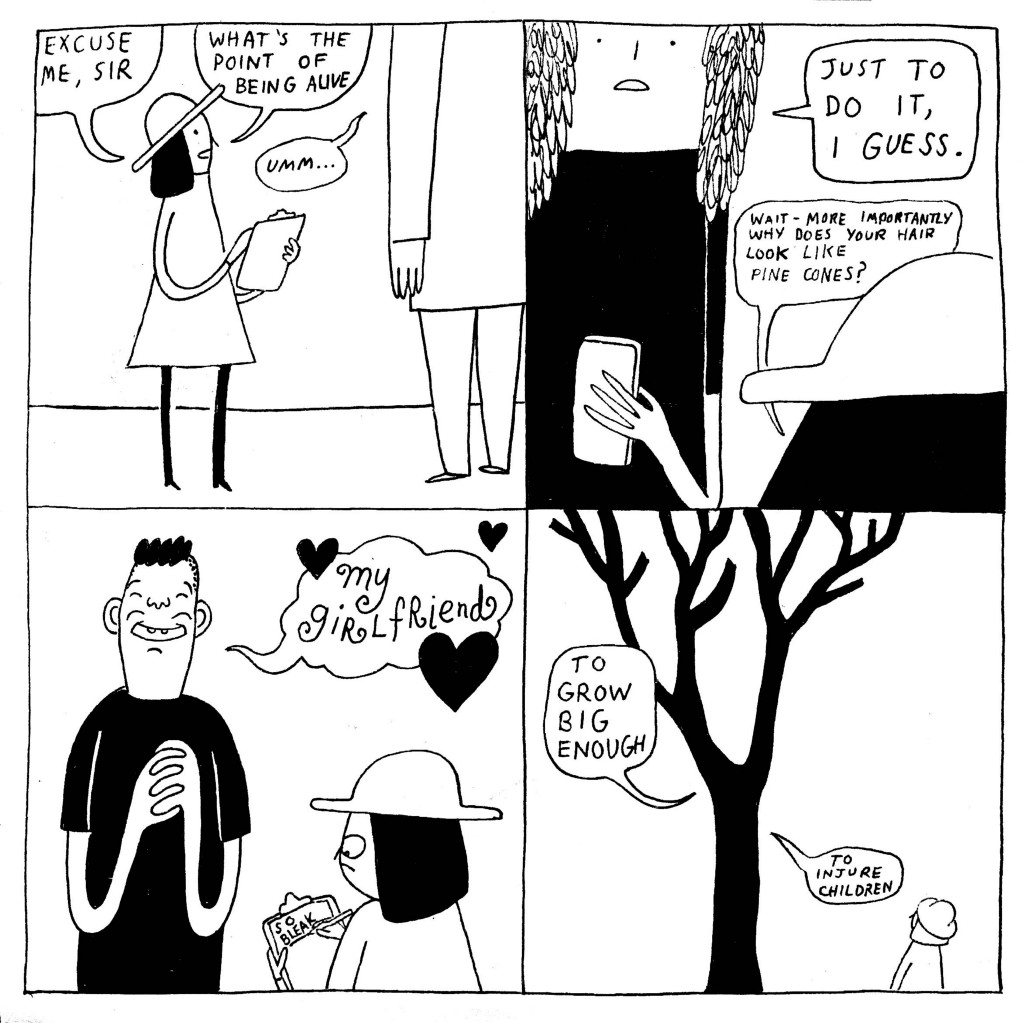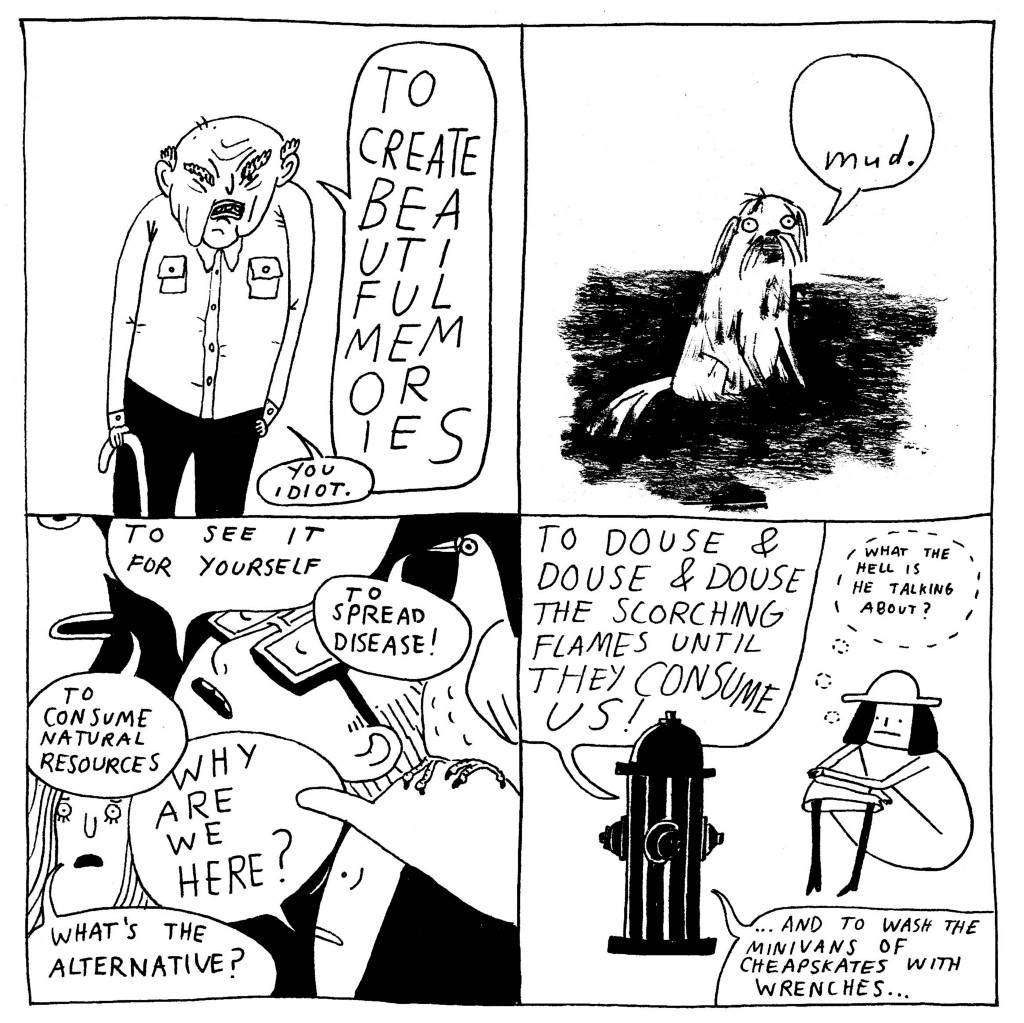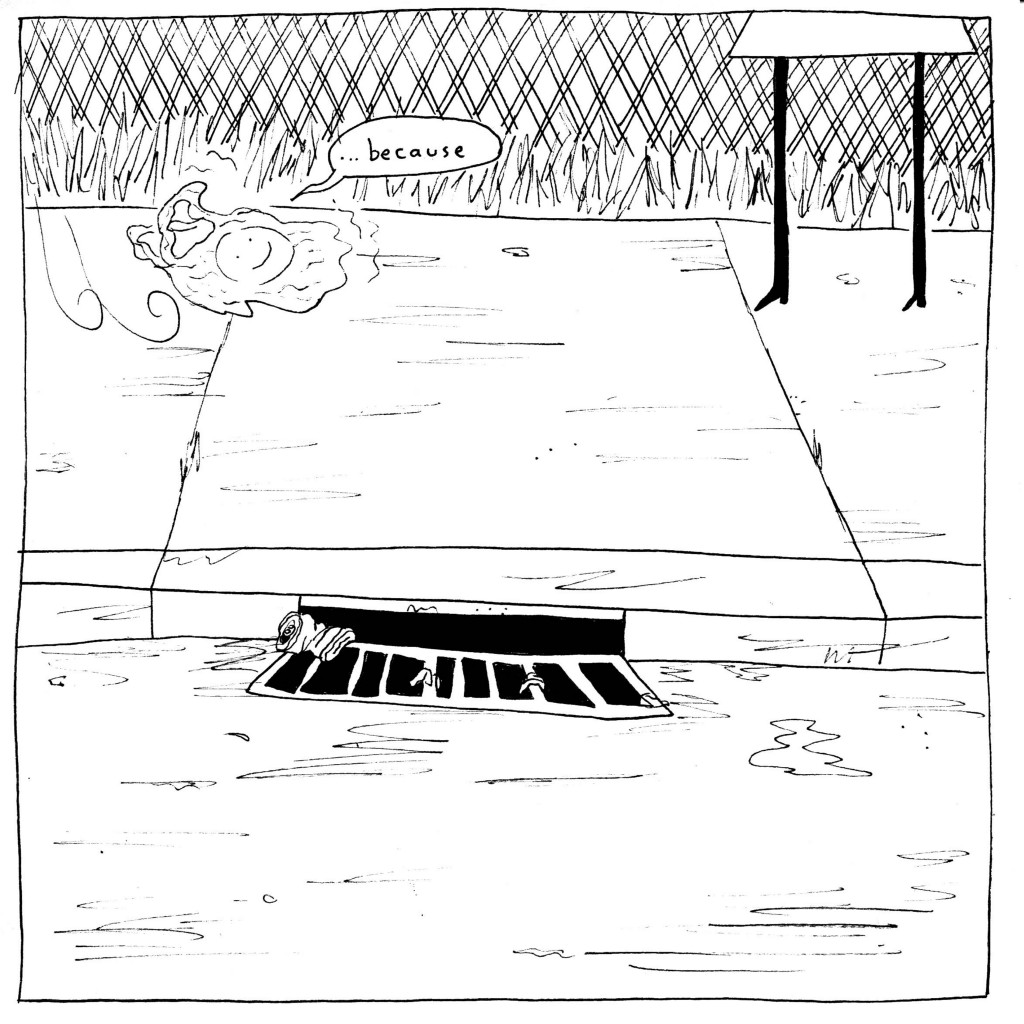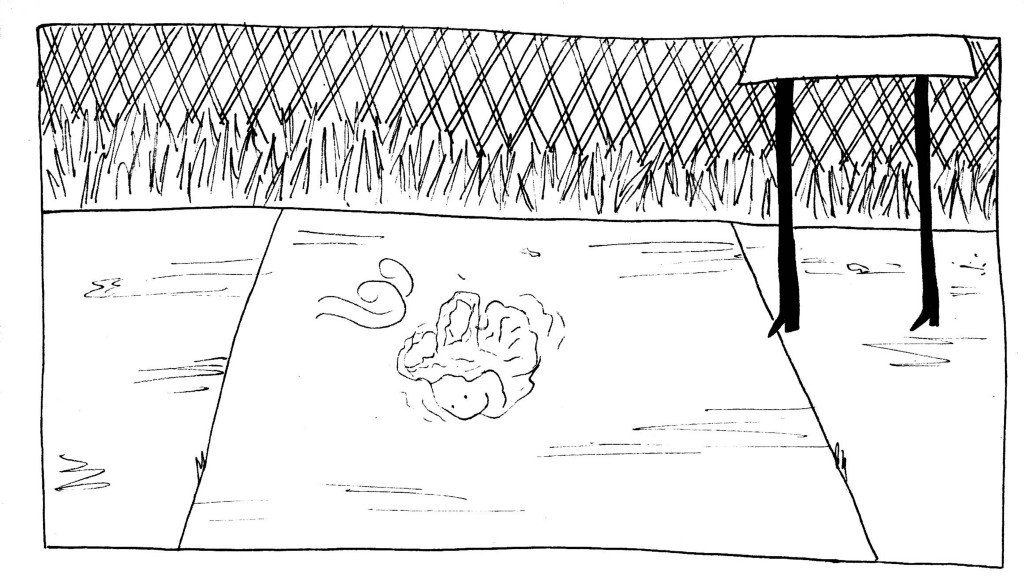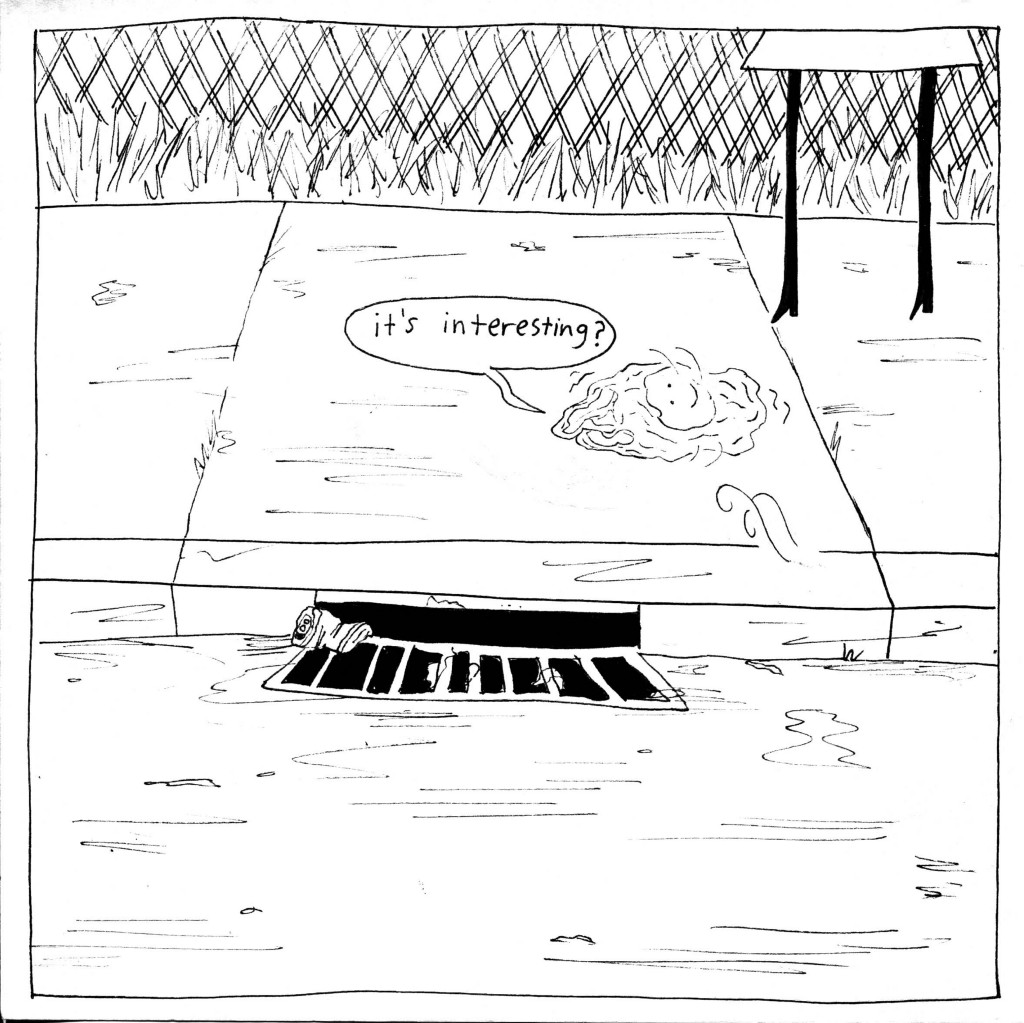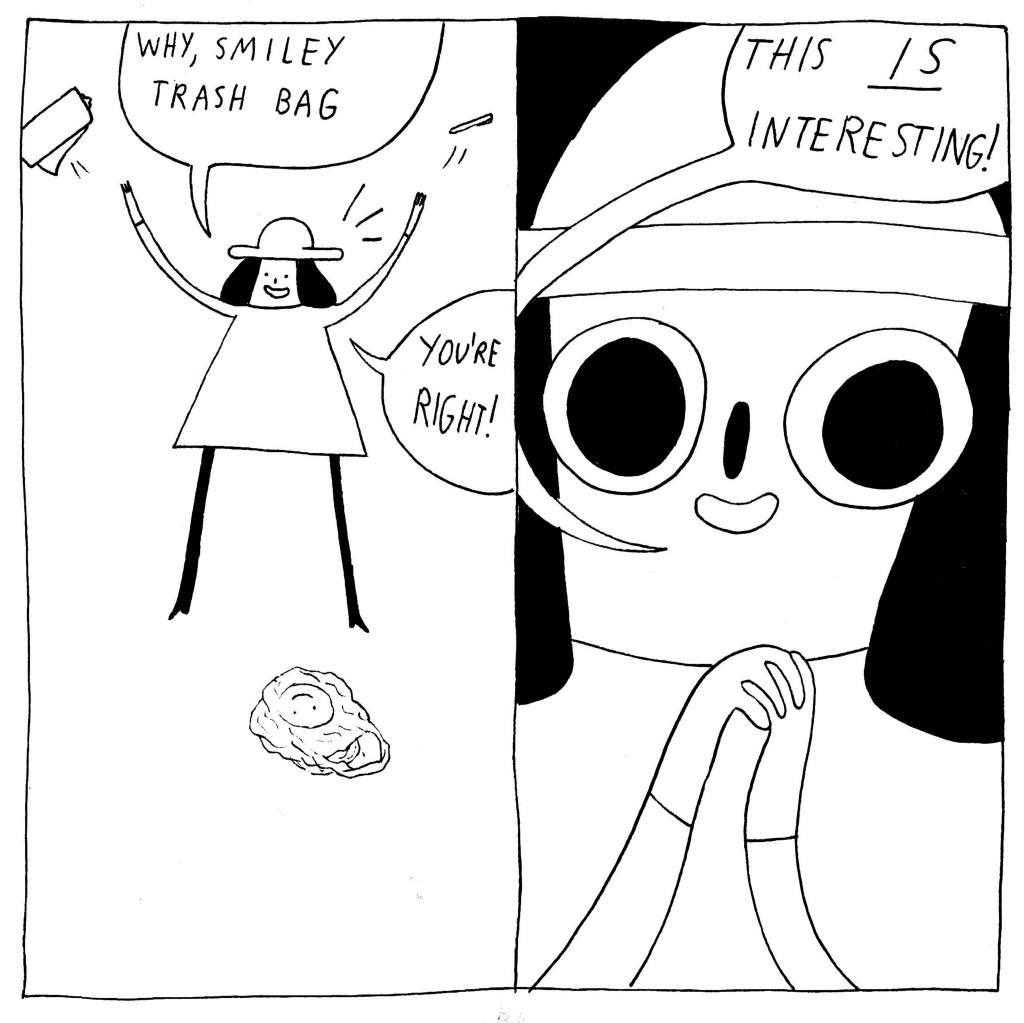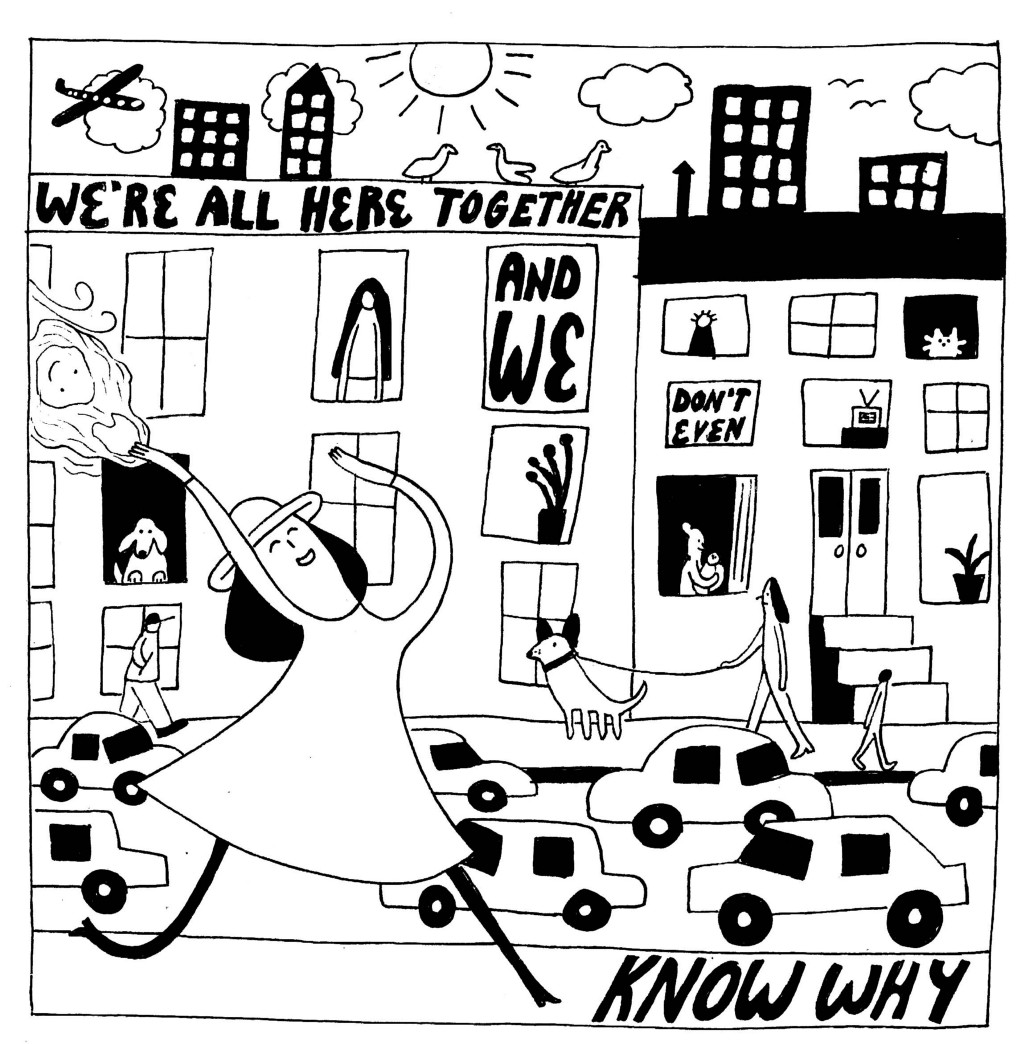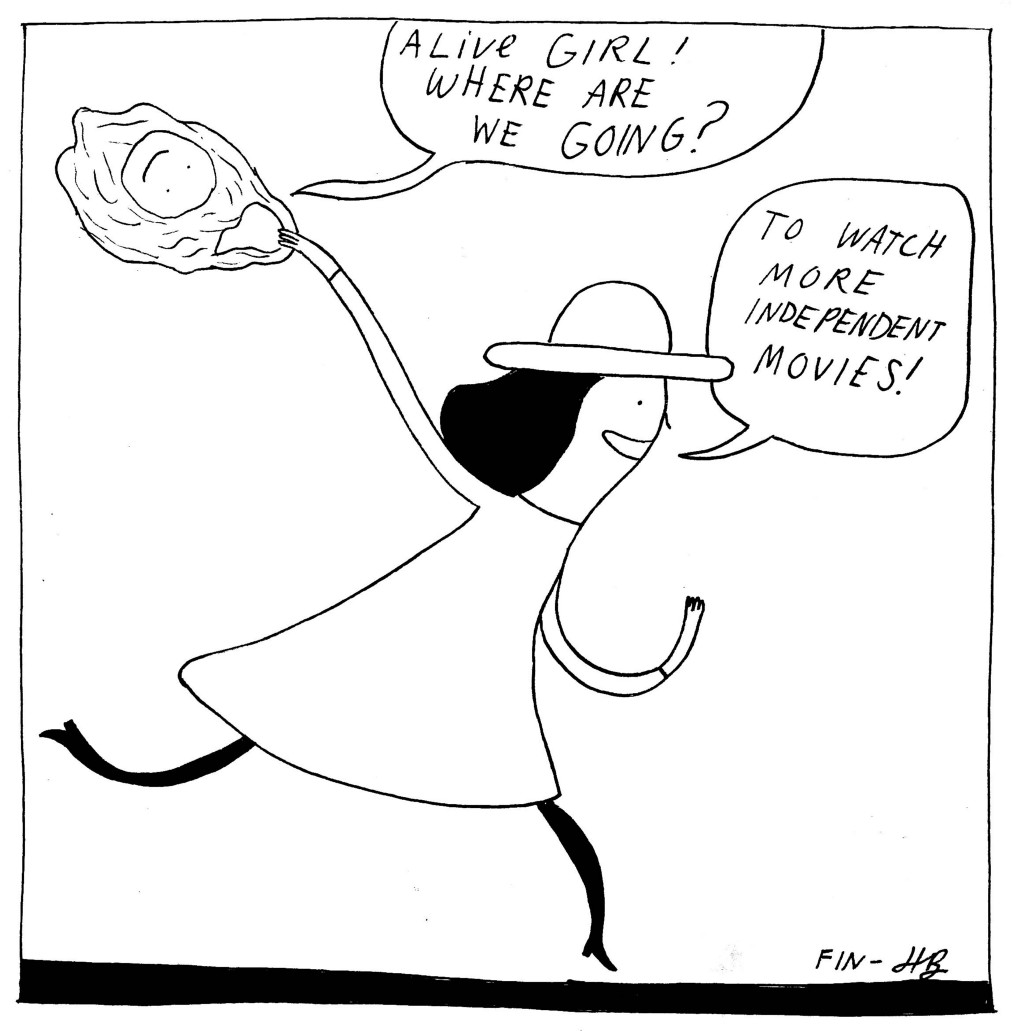New York City, January 7, 2015

★★★ The just-waning moon was bright and low in the morning. The snow held on to the surfaces it had secured the day before, unhampered by its thinness. A blinding light came poking into corner of the couch from some high angle. Clean-edged white clouds on blue gradually turned fuzzy and diffuse. The wind played its slow irregular tune on the building; a clear-the-balconies warning, for people with balconies, was posted by the elevator. The big down coat, unzipped, bounced lightly after weeks of the less warm but heavier wool one. Somehow, the cold felt more severe down in the shelter of the subway station. On the train, though, the scarf had to come off. The clouds sharpened up again; new flakes danced in the sun under a blue afternoon sky.
Twerps, "I Don't Mind"
A warm slackening song to save for the thaw; an unseasonable release date that is forgivable, maybe, because Twerps is Australian.
Birthday
A mostly unsuccessful middle-aged writer published an essay on the Internet entitled “Against the Celebration of Birthdays and Gift Giving Amongst Adults In General.” The next year, when his own birthday rolled around, no one mentioned it, no one gave him any gifts; he wondered whether anyone else in the world was even aware of his personal connection to the day’s date. Both his parents were dead, and his sister hadn’t remembered his birthday since she went to live at an ashram in India for six months in 1996. He thought about going to a bar and buying himself a special birthday drink. But he didn’t. He usually went to bars on Tuesday nights, and it was Thursday. And it was kind of cold out. So he stayed home. He was happier this way.
(Previously.)
Territory Annexed
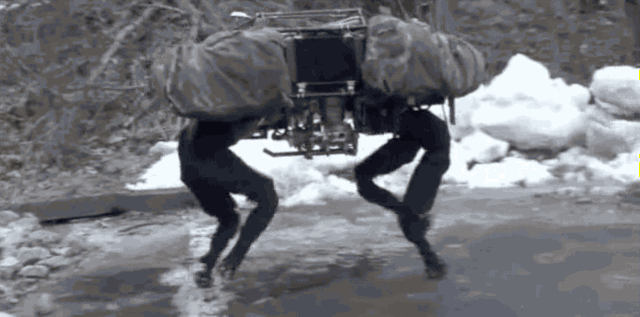
Here is an update from Facebook about what “the shift to video” — that is, the sudden prevalence of auto-playing clips posted directly to the site — means to “creators.” (These updates are the closest thing to direct guidance from Facebook that many media companies, large and small, have ever received).
It is a straightforward post about how to get your videos noticed, and shared, on Facebook. One thing to keep in mind, for example, is that your video will probably be viewed primarily on phones, where it will play automatically but without sound. You have a couple of silent seconds to capture people as they scroll by. HOWEVER, these videos should also be “raw” and “compelling” and “shareable” — videos that “no one else will have.”
Videos such as this one:
Post by Taylor Swift.

This post is titled “What the Shift to Video Means for Creators” but describes no such thing. What the shift to Facebook video means is that Facebook is more interested in hosting the things media companies make than just spreading them, that it views links to outside pages as a problem to be solved, and that it sees Facebook-hosted video as an example of the solution. A company that uploads its videos to Facebook is not the publisher of those videos. At best, it produced them.
This is where the theoretical tension between Facebook, which has been lavishing websites with traffic in return for their ability to fill its News Feeds with interesting links, and publishers, which have either accepted or pursued the audience that Facebook occasionally shares with them, becomes material. Embedded videos didn’t used to play on Facebook — you had to leave the page to visit the site that published (or embedded) them in the first place. Next, embedded YouTube videos were allowed entrance, proved popular, and made the old style of video-watching seem strange and inefficient, while still depending on, and benefiting, an outside publisher (Google, with its partners). When Facebook privileged its own videos to auto-play, it made embedded videos feel out-of-place. Facebook-native videos, which display their view counts inside the frame, are often shockingly popular, even by YouTube standards. This is the last stage in a gradual correction.
“What the Shift to Video Means,” then, is that one major type of media is being pulled in-house by Facebook; it means that Facebook is not satisfied merely facilitating the spread of other publishers’ products. It’s not that such an arrangement is unprofitable — Facebook has made a great deal of money selling ads against links to media originally published elsewhere — it’s that the new vision, in which Facebook is not just theoretically but practically constitutes the entire internet, is potentially more profitable. Publishers, in Facebook’s view, are middlemen.

“What the Shift to Video Means,” additionally, is that Facebook has been successful in its first major attempt to requisition the media that it has up until this point partnered with. It could, and probably plans to, become a new YouTube not just for video but for text and audio and whatever else (it already did this with games!). All the things we link to on Facebook now, Facebook could conceivably host.
“What the Shift to Video Means,” narrowly and less importantly but still sort of interestingly, is that the web rubrics for Facebook content will no longer be necessary — the headlines that were once designed to convince you to click and leave Facebook for a few seconds will now be responsible only for convincing you to look at the thing immediately below (if there are traditional headlines at all).
“What the Shift to Video Means,” theoretically, is that much of the benefit publishers have derived from Facebook over the last three years, which required only occasional and modest adherence to Facebook’s explicit and implicit guidance, will disappear for organizations that are not interested in ceasing to be publishers to become “creators,” or in replicating their operations on another company’s platform just because it’s the momentarily dominant channel on hundreds of millions of new machines with poorly understood potential.
“What the Shift to Video Means,” finally, is that the grand Facebook anomaly that incidentally inflated thousands of websites, some so profoundly as to distort their entire businesses and missions, may be coming to an end.

The language of the announcements doesn’t disagree, at least. From today’s post:
The most important thing to remember when creating video for Facebook is that it will be a part of News Feed. As a creator, you should be conscious that people will discover your video in News Feed next to a photo from a friend or a status update from a relative. Your video needs to fit in, and it needs to be something that your audience will want to watch and share.
This is a concise and honest assessment of what you do when you attempt to “promote” anything on Facebook: You are entering it into a direct contest — for attention and action — with everything else that people post to Facebook. This advice, and the advice that follows, is addressed to creators. Now, here is a post from December:
Over the past few months, we’ve listened to publishers around the world to better understand how we can help them connect with people on Facebook. As a result, we’ve created new tools for media publishers, made improvements to Insights, and have added more resources and communication channels for publishers.
The words “publish” and “publisher” do not appear once in the January post; the word “creator” is not used in the December post. Was there a meeting? Maybe! Do a number of people see these posts, looking out for such things, before they are… published? Almost certainly.
The mystery here for organizations amenable to a Facebook-centric existence is how they’ll make money. So far we have a mysterious and unannounced revenue-sharing plan and sponsored content. The worry with the former is obvious and familiar and old; the worry with the latter is that outside sponsored content is no different in Facebook’s eyes than, say, outside video. That it would represent an inefficiency, and one more problem to solve.
Origins Mysterious
“The Internet is at peak saturation, and news sites and popular blogs are toiling to leverage every possible piece of web real estate to capture readers’ attention. The URL, or web address, also sometimes referred to by techies as the ‘slug’ or the ‘permalink,’ is the latest spot for exploitation. Quite literally, the clickable link is the new clickbait…. As with many Internet micro trends, it is tough to pinpoint the genesis of the jokey URL. But the practice has certainly taken on steam in recent months, since BuzzFeed began to ramp up its integration of what Jack Shepherd, the site’s editorial director, calls the ‘social URL.’ Mr. Shepherd’s hope is that the humor in these URLs will compel readers to share the link with friends and followers on Facebook and Twitter.”
New York City, January 6, 2015
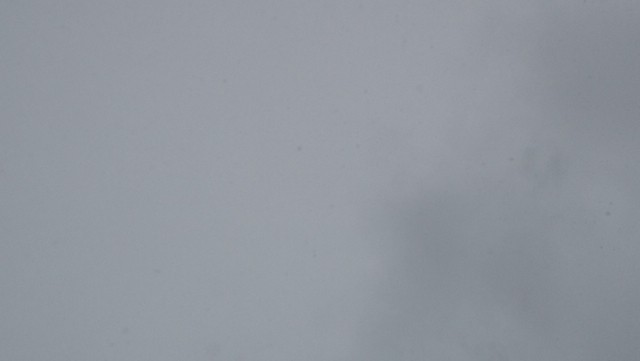
★★★★ The snow came on all at once, with no visible preliminaries, while the three-year-old was refusing to change into his underwear: fine sifting flakes, falling thickly, quickly coating the shrubbery and the cars and the rim of the fountain. Salt grains cleared their little penumbras on the sidewalk. At the time the hourly forecast said the snow ought to be stopping, it was blowing hard sideways, somehow going directly at the face whether one was headed crosstown or downtown. The snow accumulated in the bike lane and re-whitened the dark slush layer left by turning cars. It traced the branchings of discarded Christmas trees, the seams and decorative grooves in the sidewalk, the inner rim of the crosswalk signals, the top edges of the bricks where the churchyard wall bellied out. It covered the plastic-coated menus still on sidewalk tables. On the back window of a Lexus, it would tempt someone to trace the name “Clara” and two hearts with a finger. The ground was slippery, but if you paid attention to how you stepped, there was no real trouble.
The Witness, Turned Informant
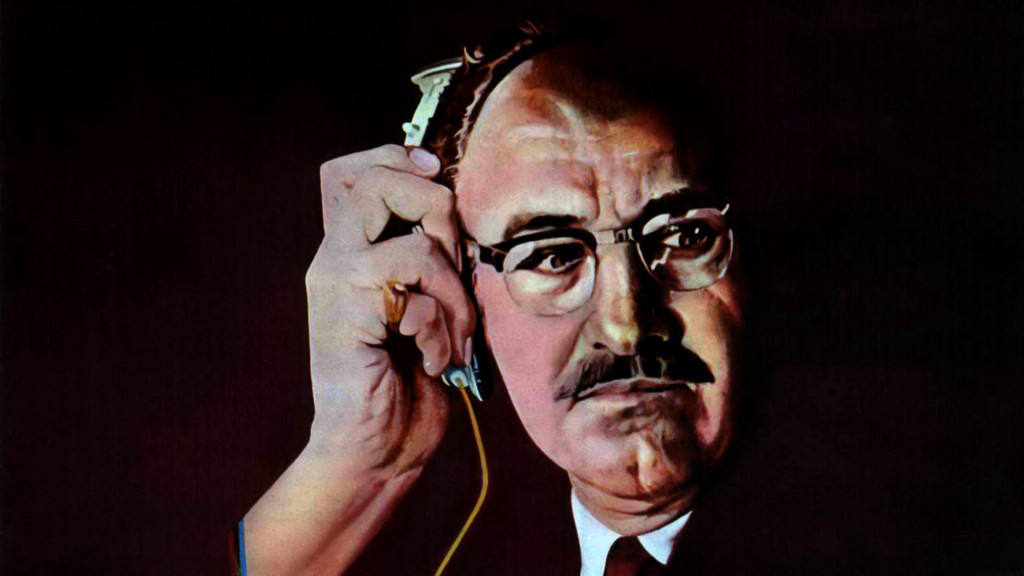
Zelda doesn’t really speak yet. But her babbles have the inflection and the silhouette of words. You can hear it in her voice, and the words I hear are, “Any day now.” We have waited for this since she was born. We speak to her constantly, we tell her we love her, we talk to her about her surroundings, her meals, her activities. When she is away from me for a few hours, I ask her how her day has been. “What did you do today, Zelda?” And soon, it is clear, she is going to begin to make sense.
When I was pregnant, I voraciously read journalist Pamela Druckerman’s Bringing Up Bébé: One American Mother Discovers the Wisdom of French Parenting. In addition to being full of techniques and tidbits which I have found both easy to apply and indispensable, Druckerman introduced me to the famous French pediatrician and psychoanalyst Françoise Dolto, whose work is sadly not very well-known in American parenting. Druckerman writes that Dolto “thought that babies begin eavesdropping on adult conversations — and intuiting the problems and conflicts swirling around them — from the womb,” and “insisted that the content” of what you say — even to a small baby — “matters tremendously.”
As a woman who was pregnant for the first time, this all made so much sense to me. But then, Zelda was born. And she didn’t seem to be in tune with me or what I was saying. Sometimes, it seemed relentlessly exhausting, calmly explaining to a wailing baby, “Time to go to sleep now, darling, I’ll see you in the morning.” How many times have I felt like a complete ass, just running through the motions of a conversation with a tiny little barbarian? Many.
In fact, her comprehension skills for a while seemed to decrease as her mental and physical faculties obviously increased. As she began to display wants of her own — to pick up this or throw that, to go over here or over there, I sometimes felt, and still feel, like Dolto was making a joke about all this, the idea that babies have reason. In practice, of course, this meant that my husband and I, in the early days, often seemed to carry on as if it were still just the two of us. Our conversations with the baby in the room were much the same as without. She didn’t seem to understand, so why bother editing out that “fuck”? Zelda couldn’t tell on us if we were talking about a friend behind their backs (not that we ever would, of course).
In the past month or so, though, it seems that old Dolto might have known a thing or two after all, and that this effort of making conversation, of telling my daughter the truth and pretending we were on something like equal footing in the rhetoric department, might not be for nothing. She listens now. She’s picked up the slightly annoying habit of yelling loudly whenever I am having a conversation with someone and she clearly wasn’t involved in it. “Talk to me! Don’t ignore me,” she seems to demand. And, more recently, when I speak on the phone in the morning, and I see her, from the corner of my eye, playing with something on the floor, she’s looking at me, and her expressions change with the intonation of my voice. She’s not spying exactly, because there she is, right in the room with me, and I’m speaking just as if she weren’t there, or as if whatever she overhears is fair game. And so it is.
The prospect of Zelda speaking and listening with comprehension is so thrilling now that it is on the cusp of actually happening that I get excited, almost shaking, just at the thought of it. I’ve spent nearly a year locked in a very intense, personal relationship with a person who is basically mute. She doesn’t have opinions, or at least, she doesn’t voice them. I suspect they are in her head alright, but I’ve yet to hear one, and so I look forward to that day very much.
It’s also terrifying. I have lived with my husband for nearly a decade. We had a long-established rhythm of how we deal with one another, and how we communicate. The only witnesses to our day-to-day private lives have been two Chihuahuas. Until now. What will Zelda think of us? Will she like us? Will she fit into the groove of our tiny family unit, or will she be a crazy third wheel? Am I the third wheel? Is Josh? Are we prepared to hear her opinion about what’s for dinner? We’ve imagined her speaking to us in largely positive terms — she’ll tell me she loves me, or that she wants to go to the park. But how will it feel when she tells me “no”? What about when she inevitably disagrees?
Zelda is a distinct person with her own ideas — that much has been clear since even before she was born. I don’t like raisins; she loves them. She likes listening to Katy Perry far more than I would prefer. She is naturally outgoing; I am a loner. But it’s been pretty easy to manage all that with her basically unable to communicate. What’s next is that Zelda becomes a full member of the family. Until now, it’s like she’s been auditing us and we her. We adore her. I want to cuddle her and smother her with affection and to teach her about all of the wonderful things in the world. And I can’t wait to hear what she has to say about it.
Belle and Sebastian, "Nobody's Empire"
Belle and Sebastian, “Nobody’s Empire”
I have been listening to this first track from the new Belle and Sebastian album We Are Not Helping Our Reputation For Twee Affectation With These Long Titles over and over again trying to figure out what is so good about it and I am still not sure. It shouldn’t work: The verses never resolve into a chorus, leaving the listener in a state of vague dissatisfaction, and yet the crescendo at the end is somehow so uplifting that it almost makes you smile, tiresome religious aspects notwithstanding. I guess it’s the closest they’ll get to gospel, but I have to say I like it. I like it a lot. And I am not a person who has a lot of like left, so there must be something to it. This video has been around for a month but you may have been busy over the last few weeks what with drinking and sadness, so give it a whirl if you missed it. Phrase That Sounds Like A Non-Native Speaker’s Idea Of Profundity is out January 20th.
Fly
A drunk college student watches a fly crawl into an almost-empty bottle of red wine sitting on a coffee table in the living room of a shared suite. He leans forward and corks the bottle, trapping the fly inside. The fly buzzes wildly, bouncing its body off the glass with a soft, repeated plink. The student watches and listens for a while — thinking about whether or not insects feel pain, whether or not alcohol dulls that pain, the human capacity for cruelty and the rationalization thereof, how much oxygen insects expend with each breath, about how many cubic centimeters of oxygen might be in the bottle — before passing out on the couch.
An hour goes by and the student wakes up. One of his roommates has returned from a party, and stands by the table, draining the remains of the bottle, fly and all, into his mouth.
(Previously.)

